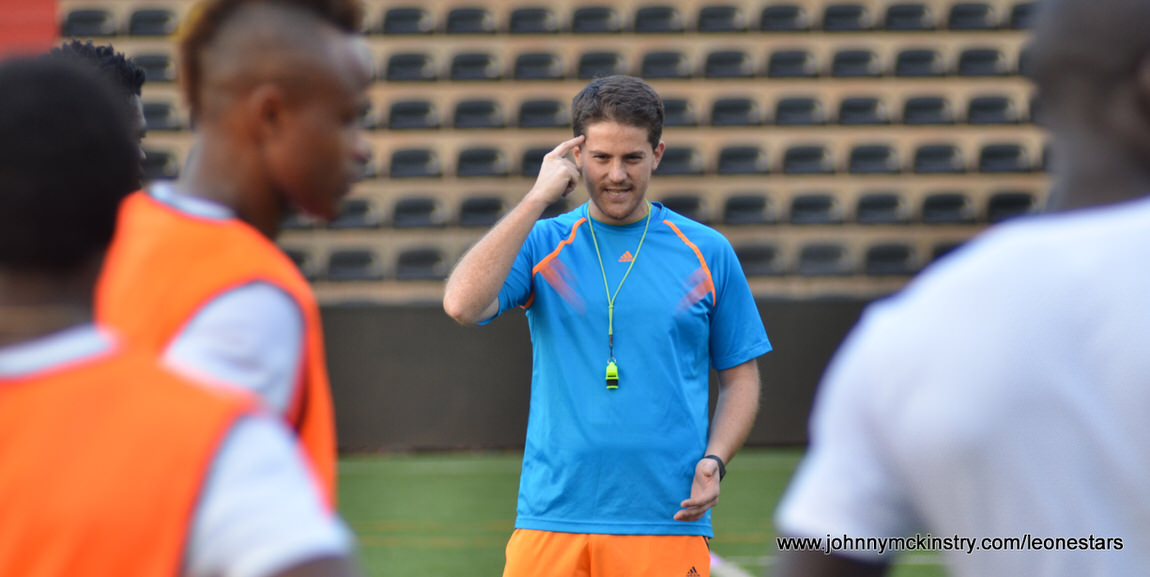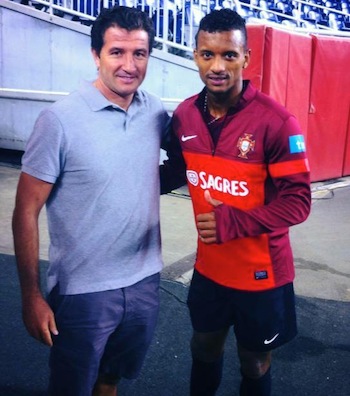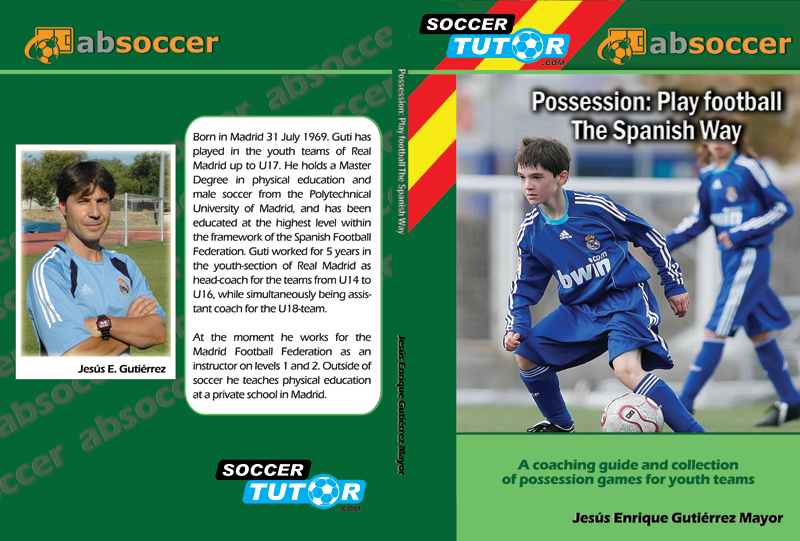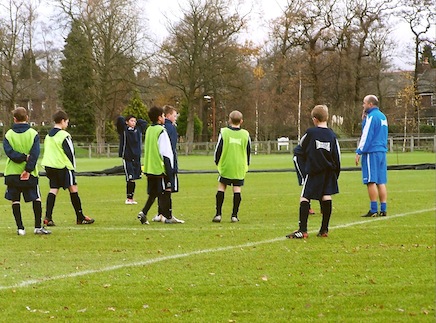This week I’ve gone Nordic, I’m speaking to Swedish Coach Dennis Hortin from AIK Alvsjo. Dennis has some very forward thinking and progressive views on player development. This possibly the longest and most informative interview I have done. I thoroughly enjoyed chatting to him.
Let’s Start >
DH: This is by far the most I’ve written in english for a good while, so I know there’s a lot of spelling and grammar fails in there, so please point me to them and perhaps suggest how I can phrase it differently if you have time.
TCD: I don’t really like to add or change your words. It’s nice to listen to non-English speaking coach. If I feel there is a need to change a word or two I will. Otherwise we keep your words. So lets start.
TCD: How did you get into coaching?
DH: I’ve been in to football since I was 6 years old, and until I was 26. everything was focused on my own journey as a footballer but from this age I slowly moved towards coaching. I don’t know why exactly or if I deliberately wanted to be a coach but since my contracts as a footballer rarely gave enough money to pay for my bills and food I had to earn more money which often ended up in additional responsibilities in a club and in most cases that was to engage in youth coaching.
I found it very interesting and the interactions with youth players quickly made me aware of that knowing the game and “teaching” (I’ll get back to the quote later) it are two very different concepts. I started to dig deeper into coaching and that eventually ended up in a great interest for learning, What learning actually is and the coaching that got me hooked.
It is very interesting and a lot more complex than what I initially thought.
I’m 34 now, so actually starting on my 10th year as a coach now in 2015. Time flies and I think it’s important to reflect on what I do and how I practice to minimise the risk of me just repeating my first year as a coach over and over.
TCD: You might talk to me about your coaching philosophy?
DH: First of all, I want to get away from tradition and market driven forces since they are rarely evidence-based.
I’m aware evidence is rarely fundamental truths, but to cite Dr Richard Bailey, “Thou shalt embrace science for it is a candle in the dark.”
Meaning that I try to guide my self with evidence, but apply it in the context of the socio-cultural aspects and challenges in the society were I practice.
So in practice, it’s an holistic approach that comes down to a bio-psycho-social (BPS) balance, game based practice design focused on deliberate play, self-determination theory (SDT), early engagement/diversification/sampling and late specialisation and promotion of multi sport activity. Also to nurture a mindset of growth and learning and a guided discovery type of approach that also are very much in line with the UN child convention and “Idrotten Vill” (the Swedish National Association of Sports guideline “The will of sports”).
It is also a game that requires a lot of soft skills such as creativity, decision making and co-operation. These are concepts that are fundamental to the game and that technically can’t be taught, but it can be learnt. Hence why I quoted “teaching” previously. It’s all about the environment I create that provides learning opportunities for the players to develop these soft skills, and I need to back off to give them room to learn.
To me, it’s not about being on top of the players and dictate and instruct learning. The learning is their journey and I just provide an environment that allows learning and needless to say representative tasks are fundamental. Pretty much everything I do is game based.
TCD” What coaches inspire you?
DH: Coaches that aren’t stuck in tradition and that are open for debate. But mainly, I tend to follow people outside the world of football since I feel it’s so much tradition bias in what is often preached.
While I can see the excellence in coaches such as Guardiola, Bielsa, Mourinho etc, I’m not sure what they practice always aligns with youth football and learning. Their world is completely different from mine. I find much more useful inputs, discussions and interactions thru contacts on social networks. After all, there are so many excellent youth coaches out there that aren’t known to the public, and they are the ones I can get so much from. And of course people like Côté, Toms, Bailey, Kidman, Pearce, Hancock etc.
Interactions with people like mentioned above really help me improve my coaching. The ones that inspire me are not the type of coach who stands on the top of an iceberg only acknowledge and preach what is visable above the surface. It’s the ones who see what’s below that inspire me.
TCD: What is your current role at the club?
DH: I work as head of youth (boys 5-13 mainly, but are involved in 14-16 as well) as a coordinator which means that I interact with around 40 youth teams and close to 100 volunteer coaches and I’m there for them in terms of practice design, discussion regarding BPS balance in our programme, communication, promotion of the application of SDT, diverse content, the promotion of multi sport activity and planning. Most of them are parents and to me, that is excellent. Many voices in the football industry blame the “not educated” parents at youth level when player development falls short at the elite senior level. The best thing with parents are that they are there for the child, they have mature values and are open for ideas and discussions. With just a little bit of support and a few meetings a year, parents are awesome youth coaches.
I’m involved in our programme and curriculum, and also run sessions in the afternoon from 3-5 PM for children 10-16 year olds that want to play more football.
And on top of these practical responsibilities, administration and communication are important to constantly maintain and a huge part in a role like mine.
TCD: How many teams do you have at the club?
DH: As stated above, my responsibilities are at the boys 5-13, and that’s about 40 teams. But in the club, it’s almost 70 teams if boys 14+, seniors and the girls/woman side are included. We have 100 teams playing each weekend, and we’re the 9th biggest football club in terms of number of youth players in Sweden. We have around 1400 active youth players in the club. Reason why we have 100 teams playing each weekend, but only 70 teams “on paper” so to speak is that each team consist of 18-30 players which means that some teams need to register for two or three parallel series to ensure enough pitch time for all players. Ages 5-7 don’t play fixtures.
TCD: From what age do teams begin to play in organised fixtures?
DH: From 8, they play 5 vs 5. This is subject for debate imo. But with the way pitch time are dictated it’s hard to structure it in another way at the moment. I’d like the StFF (Stockholm regional FA) to remove organised fixtures at ages below 11 and promote pool play rather than the adult type of season schedules.
TCD: Talk to me about the football format in Sweden (numbers on each team at a specific ages etc)?
DH: That’s different from club to club, but in general, in the more crowded areas, I’d say 18-30 players in a team. That requires several teams playing each weekend like mentioned above. It’s common that a team of ~25 players are registered for 3 parallel mini leagues to ensure pitch time for all players. We have players in the club from 5 year olds (just play activities 18 sundays over the year), and 6 and 7 year olds that don’t take part in organised fixtures, but come together once a week to play.
Parents do the coaching, and in general there are no payed coaches below senior level but we’re moving towards hired coaches younger ages. Coaching is also considered a job here but economy and priorities are holding up the progress.
It’s hard to talk for all clubs of course but in general this is what it looks like. And in no way do I think this is a good setup from an optimal player development perspective. We definitely need change.
TCD: What pathway has your club adopted and what to you believe is the best pathway for development, when do you grade etc?
DH: In contradiction to tradition and market, we don’t split youth football in elite and recreation. We believe that they should and need to co-exist for our programme to be effective, no matter if our ultimate goal is to contribute to our society in terms of healthier people or elite level participation. We don’t grade players but from 17, when most are through puberty, we have a U17 team that participate in the top domestic league. The first age group that entered this new model was our boys born in 2001. When they reach 17, our hopes are that we can have a full team in the U17 team that competes at the top national level and a “shadow team” that run parallel with players that aren’t there yet, but that get the same opportunities as the main U17 team to perhaps challenge for a spot in our U19 team that also compete at the highest national level.
So from 17, you could say that we have two parallel pathways but with the same opportunities, and with the understanding of that trying to identify future success is risky business, even as late as at 17 or even 19. So it’s a lot about keeping players in the club for as long as possible and maintaining equal opportunities.
We also promote diverse content all year around for 6-9 year olds and during the winter for 10-12 year olds. This isn’t optimal, but for now a good way to include diverse training for those who don’t participate in other sports. As much as possible should be game based activities and coaches are encouraged to let the kids help out with planning and content. From around age 10, we include what the Swedish school of sport and health sciences label as “pedagogical rules”. No players have fixed positions before age 16. All players have equal pitch time. This isn’t the case yet for our U17, U19 and senior teams, but hopes are we’re educating good enough and many enough players to provide our U17, U19 and senior team with homegrown players and at a level good enough to allow rotation in the future.
From 13, we have teams registered at three different levels to provide diverse opposition for our players. But we don’t practice ability grouping prior to 17. All teams in an age group practice at the same time and under supervision of an age group manager, which is similar to my role but concentrated at one or two age groups. Reason why we keep all teams in each age group together from 13 is that we want to slowly bring them together for a softer transfer to our U17 team, which of course will consist of players from different teams and if they already know each other we put less stress on the players psycho-socially and the team will hopefully be up and running instantly in contradiction to what’s currently the case, which of course favours environment and learning climate as well.
This is a very brief conclusion to our model, and restricted to the boys/mens sides. I’d might add that not everyone buys in to this yet, so some teams still run traditional approaches, but we’re getting closer and closer for each year.
TCD: Across the world it seems winning has now become a priority for many coaches working in youth sport. Is this the same in Sweden?
DH: Yes I agree, but I think we need to define “winning” in terms of a motive or priority. I don’t think winning is the motive, but more a “bi-product” of the false idea that ability grouping is a must to develop future elite players and that end up in currently weaker players being left behind, ending up in selected teams winning more than non selected teams. This is the common belief and practice in Sweden. So in regards to your question and in the light of my “definition”, yes, winning seems to be important.
TCD: How has player centred coaching evolved in Sweden?
It’s getting there. We’ve had a debate over the last couple of years that are culminating right now in the light of how our senior national team drops on the FIFA rankings and how few players we have represented in the top European leagues.
The generation born in the late 60’s to early 80’s like Zlatan Ibrahimovic, Fredrik Ljungberg, Olof Mellberg, Henrik Larsson, Kim Källström, Thomas Brolin, Patrik Andersson, Stefan Schwarz, Jonas Thern is soon gone. Only Zlatan and Kim still playing of the ones I mentioned, and they are well over 30 years old, and no new players from the mid 80’s and later seem to fill their place. This has definitely added to the debate in Sweden and I think we’re about to see a lot of change. Though, policymakers and authorities perhaps don’t lead the change. It’s more of something that comes from the “people” which of course is a good thing, because it will be more accepted than if changes are dictated from the top. Same procedure as player centred coaching pretty much.
But from time to time, our national and regional FA’s propose changes. The SvFF are currently making changes to the coach education programme, and the regional FA’s that run most of the youth competitions have recently made changes that are very positive. The tradition is still a coach centred one, but the player centred approach are being practiced more and more. We’re not there yet, but as initially stated, we’re getting there.
What’s the SFA’s vision for coaching in Sweden?
The SvFF are making changes, but I’m not entirely sure they are in control. For example the LTAD model is being used and marketed as change without any obvious changes to content. It looks good to the naked eye perhaps and “makes sense” to the general public with “ages and stages”, but learning, development and progress are so much more than chronological age, it’s a very sensitive process that is effected not only by biological development, but psychological and social development as well, and many models fail to take that in to consideration. That’s why it’s so dangerous to use it. I think authorities should be expected to deliver a more thought out model.
With that said, I do think that SvFF is on the right path, even though progress is slightly slow and a bit off at times.
So I’d say that the vision is blurry, but the progress towards something is on and currently in the right direction.
What’s the one thing you would change about youth football in Sweden?
Oh, I’m not sure I can restrict myself to just one thing, but If I had the power to change things, it would be to create multi sport clubs for 5-16 year olds, and sport specific clubs shouldn’t engage players younger than 11. In that way there’s a good window for 11-16 year old players to choose to specialise, and time for a more diverse type of content that are of great value long-term. Academies should start at 17 when the majority of kids are through puberty but since it’s so hard to predict future success even as late as at 17, academies and traditional clubs should work together rather than competing at admin level to ensure a wide path to the senior game.
To support this financially, (brace yourself) I’d also like to cancel all youth national teams and youth regional teams below U19 level since I can’t see the value of a system that either give false indications to the ones who are included, or exclude players that perhaps shouldn’t have been. It provides nothing more than psychological setbacks. Hence why we don’t practice ability grouping prior to 17 and parallel to U17 and U19 will run shadow teams.
I understand this is very thought provoking, but I think that this is much in line with what evidence suggest.
On top of that I’d like to see changes in content and tradition as well, but I’ll stop here.
What advice would you give to a coach starting out?
Find your own way, and look deep and wide for input and ideas. Look beyond the sport specific content, and look in to several areas of research. Such as psychology, sociology, neuroscience, physiology and try to grasp the complexity of it all. Search for contradictions in what is preached, follow and interact with people who talk straight. This will not lead to knowledge, but it will help you grasping the complexity.
A final message if you like?
I’d like to take this opportunity to highlight some common myths in youth sports.
Early specialisation, 10000 hrs, isolated technique practice, learning styles and ability grouping are frequently preached and practiced with no evidence to support it. This is a slippery slope in my book, and any one that preach such practice as obvious or something that shouldn’t or can’t be questioned simply don’t know what they are talking about.
And finally I want to state that since youth sports and development is so complex, I don’t think there are any right answers.
However, I do think there are answers that are wrong.
-END
TCD would like to thank Dennis for contributing to the blog. Certainly one of the most informative and honest interviews I’ve had the pleasure to do.
Follow him on twitter @DHrtin
I always like to hear your opinions. Please comment below or email me info@thecoachdiary.com, if you don’t have anything to add then please forward this on to a friend.
Thanks for reading. I’m also on twitter @Coachdiary
















